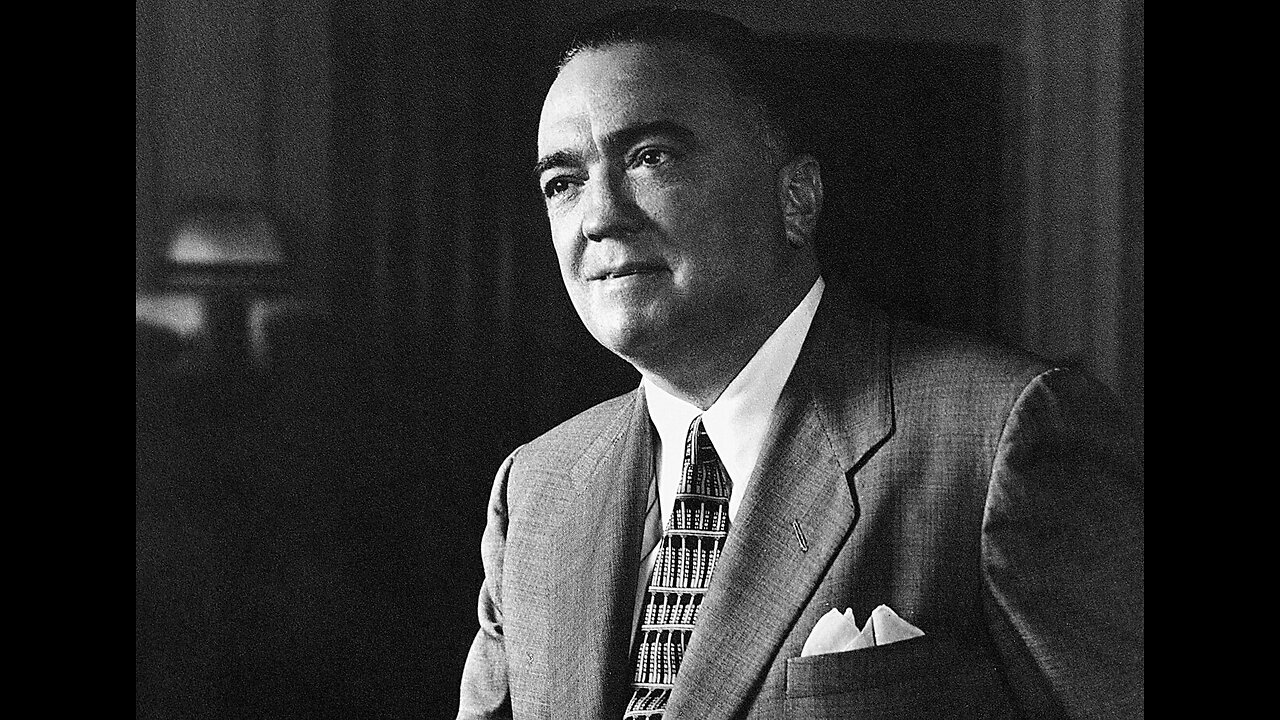Premium Only Content

When a Group Broke into the FBI and Revealed the COINTELPRO Program (2014)
1971 is a 2014 American documentary film and the directorial debut of producer Johanna Hamilton, who also co-wrote the film. The film had its world premiere on 18 April 2014 at the Tribeca Film Festival and focuses on the break-in of an FBI office in Media, Pennsylvania on Monday, March 8, 1971, to steal over 1000 classified documents.[3] It was pitched at the Sheffield Doc/Fest 2011 MeetMarket preceding its debut. The break-in took place on the night of the first Ali-Frazier boxing title fight dubbed the Fight of the Century.
Hamilton was inspired to create the film after learning that Betty Medsger was working on her book The Burglary: The Discovery of J. Edgar Hoover’s Secret FBI, which discussed the 1971 events and revealed the identities of many of the participants, who had remained anonymous up to that point.[4]
Synopsis
The film focuses on the events of March 8, 1971, when eight people orchestrated the burglary and public distribution of government files from an FBI office in Media, Pennsylvania. The theft was altogether different than the numerous contemporary draft board office break-ins, in which activists (including many of the burglars) burned government draft paperwork to interfere with America's continued participation in the Vietnam War. The group, all of whom were ordinary citizens, called themselves the Citizens' Commission to Investigate the FBI and stole every file in the office. The goal of the burglars was to gather tangible evidence of government surveillance of civilian political activists, which was infringing on First Amendment rights. The stolen files exposed that the FBI was indeed running extensive, illegal operations intended to spread paranoia and distrust among numerous New Left and black civil rights organizations. (Other files included training manuals, information about organized crime, and information about draft resistance.) Over time, the group mailed copies of the files to various newsrooms. Most news organizations returned the files to the FBI and refused to run stories regarding the stolen documents, but the notable exception was The Washington Post, which ran a front-page story on March 24, 1971, about the files which were mailed to journalist Betty Medsger. Arguably the most significant element in the stolen materials turned out to be a single file mentioning "COINTELPRO", a secret surveillance program that was run by J. Edgar Hoover. Subsequent investigations and freedom of information requests regarding COINTELPRO played a role in the 1975 Church Committee.
Reception
Site of the 1971 break-in in Media, Pennsylvania
Critical reception for 1971 has been positive.[4][5] Washingtonian and Variety both praised the work,[6] which the Washingtonian described as "a compelling documentary that provides a powerful perspective on the current debate about the men and women who risk everything to disclose government secrets."[7] Indiewire also gave a favorable review, praising Hamilton's directing and stated "Her film is not celebratory, lingering on the notion that, with the public charade of COINTELPRO, ultimately the FBI won. While their post-break-in behaviors are mocked, the government credits itself with tactics specifically utilized to "enhance the paranoia," creating a culture of fear that still exists today."[8]
See also
List of films featuring surveillance
References
"1971". Retrieved 2019-01-29.
Sutcliffe, David Felix. ""A Different Approach to Dissent": 1971 Director Johanna Hamilton and Whistle Blowers on Government Abuses". Filmmaker Magazine. Retrieved 9 October 2014.
"1971". Tribeca Film Festival. Archived from the original on 2014-10-14. Retrieved 9 October 2014.
Jennings, Sheri. "Tribeca: Johanna Hamilton, 1971". Screen Daily. Retrieved 9 October 2014.
"1971 (2014)". Rotten Tomatoes. Retrieved 9 October 2014.
Scheib, Ronnie. "Film Review: '1971'". Variety. Retrieved 9 October 2014.
Mullins, Luke. "AFI Docs Review: "1971"". Washingtonian. Retrieved 9 October 2014.
Toro, Gabe. "Tribeca Review: Incendiary Political Documentary '1971'". Indiewire. Archived from the original on 2014-10-15. Retrieved 9 October 2014.
External links
Official website
1971 at IMDb
Categories:
2014 films2014 documentary filmsFilms set in 1971American documentary filmsDocumentary films about United States historyWorks about Federal Bureau of Investigation1971 in American politics2010s English-language films2010s American filmsEnglish-language documentary filmsDocumentary films about Pennsylvania
The FBI–King suicide letter or blackmail package was an anonymous 1964 letter and package by the Federal Bureau of Investigation (FBI) which was allegedly meant to blackmail Dr. Martin Luther King Jr. into committing suicide.[1] However, despite popular belief, it remains unclear what the letter's intentions were.[1]
History
On November 21, 1964, a package that contained the letter and a tape recording allegedly of King's sexual indiscretions was delivered to King's address. Although the letter was anonymously written, King correctly suspected the FBI sent the package.[1][2] King's wife Coretta Scott said the tapes comprised only mumbo jumbo.[3] The letter does not specify exactly what action it is urging King to undertake; King understood the letter to advocate that he commit suicide,[1] although some have suggested that it was urging him to decline the Nobel Peace Prize which he was awarded in 1964,[4] or step out of leadership.[1] Portions of the letter which were revealed in 2014 noted that the letter praised "older leaders" of the civil rights movement such as Roy Wilkins.[1]
On March 8, 1971, an activist group called the Citizens' Commission to Investigate the FBI burglarized a local office of the FBI in Media, Pennsylvania, and stole classified documents. Parts of them exposed a secret FBI operation called COINTELPRO. Those documents were later sent to newspapers and members of the United States Congress. During the Church Committee hearings and investigations in 1975, a copy of the "suicide letter" was discovered in the work files of William C. Sullivan, deputy FBI director.[5] He has been suggested as its author.[6][1] Once the existence of surveillance tapes of King was publicly revealed, Bernard Lee and the Southern Christian Leadership Conference (SCLC) filed a lawsuit to have tapes from wiretaps destroyed.[7] Their request was denied by United States District Court for the District of Columbia judge John Lewis Smith Jr.[7] He ordered all tapes sealed for 50 years and placed into the National Archives and Records Administration.[7]
Since 1977, attempts have been made to release the recordings in the United States Congress. Republican Senator Jesse Helms from North Carolina in 1983 sought to reveal information about King in order to undermine the establishment of Martin Luther King Jr. Day.[8] The Martin Luther King Jr. Records Collection bill, which would designate King government files for "presumption of immediate disclosure", was introduced in Congress by Democratic Representative Cynthia McKinney from Georgia in 2002 and 2005, by Democratic Senator John Kerry from Massachusetts in 2006, and by Democratic Representative John Lewis from Georgia in 2010, but never passed by Congress.
The full letter was discovered in J. Edgar Hoover's confidential files at the National Archives in 2014 by historian Beverly Gage. It was soon published in The New York Times, with only one name being redacted because "The Times could not verify or disprove the claims about her."[1] Gage noted that some still claim the letter's intent was "simply meant to push King out, not induce suicide." and that an uncovered portion of the letter suggested that FBI wanted King to step down and let other men lead the civil rights movement, stating that "Another uncovered portion of the note praises “older leaders” like the N.A.A.C.P. executive director Roy Wilkins, urging King to step aside and let other men lead the civil rights movement."[1]
Text
The text of the letter is as follows:
KING,
In view of your low grade, abnormal personal behavoir [sic] I will not dignify your name with either a Mr. or a Reverend or a Dr. And, your last name calls to mind only the type of King such as King Henry VIII and his countless acts of adultery and immoral conduct lower than that of a beast.
King, look into your heart. You know you are a complete fraud and a great liability to all of us Negroes. White people in this country have enough frauds of their own but I am sure they don’t have one at this time that is any where near your equal. You are no clergyman and you know it. I repeat you are a colossal fraud and an evil, vicious one at that. You could not believe in God and act as you do. Clearly you don’t believe in any personal moral principles.
King, like all frauds your end is approaching. You could have been our greatest leader. You, even at an early age have turned out to be not a leader but a dissolute, abnormal moral imbecile. We will now have to depend on our older leaders like [Roy] Wilkins a man of character and thank God we have others like him. But you are done. Your “honorary” degrees, your Nobel Prize (what a grim farce) and other awards will not save you. King, I repeat you are done.
No person can overcome facts, not even a fraud like yourself. Lend your sexually psychotic ear to the enclosure. You will find yourself and in all your dirt, filth, evil and moronic talk exposed on the record for all time. I repeat — no person can argue successfully against facts. You are finished. You will find on the record for all time your filthy, dirty, evil companions, male and females giving expression with you to your hidious abnormalities. And some of them to pretend to be ministers of the Gospel. Satan could not do more. What incredible evilness. It is all there on the record, your sexual orgies. Listen to yourself you filthy, abnormal animal. You are on the record. You have been on the record — all your adulterous acts, your sexual orgies extending far into the past. This one is but a tiny sample. You will understand this. Yes, from your various evil playmates on the east coast to [redacted][a] and others on the west coast and outside the country you are on the record. King you are done.
The American public, the church organizations that have been helping — Protestant, Catholic and Jews will know you for what you are — an evil, abnormal beast. So will others who have backed you. You are done.
King, there is only one thing left for you to do. You know what it is. You have just 34 days in which to do (this exact number has been selected for a specific reason, it has definite practical significant. You are done. There is but one way out for you. You better take it before your filthy, abnormal fraudulent self is bared to the nation.
See also
Civil Rights Movement
SEXINT
MLK/FBI
References
Notes
The New York Times obscured the name of a person stated in the letter as involved with King because they could not verify the claim.[1] Other portions of the letter which were previously not made public were uncovered in 2014.[1]
Footnotes
Gage, Beverly (November 11, 2014). "What an Uncensored Letter to M.L.K. Reveals". The New York Times Magazine. Retrieved June 25, 2017.
Powers 2004, p. 246.
Dyson, p. 217.
Powers 2004, pp. 246f.
Powers 2004, p. 290.
Powers 2004, p. 245.
"Judge Orders Seal on King Wiretaps". Deseret News. United Press International (UPI). February 1, 1977.
Romero, Frances (January 18, 2010). "A Brief History Of: Martin Luther King Jr. Day". Time. Retrieved April 15, 2016.
Works cited
Dyson, Michael Eric (2000). I May Not Get There with You: The True Martin Luther King, Jr. Simon and Schuster, 2000. ISBN 9780684867762.
Powers, Richard Gid (2004). Broken: The Troubled Past and Uncertain Future of the FBI. Simon & Schuster. ISBN 9780684833712.
Further reading
Wikisource has original text related to this article:
FBI–King letter
Abernathy, Ralph David (2010). And the Walls Came Tumbling Down: An Autobiography. Lawrence Hill Books. ISBN 9781569762790.
Gage, Beverly (October 13, 2022). G-Man: J. Edgar Hoover and the American Century. Simon & Schuster Ltd. ISBN 9780857201058.
Garrow, David J. (2015). The FBI and Martin Luther King, Jr.: From "Solo" to Memphis. Open Road Media. ISBN 9781504011532.
Garrow, David J. (2015). Bearing the Cross: Martin Luther King, Jr., and the Southern Christian Leadership Conference. Open Road Media. ISBN 9781504011525.
Gentry, Curt (2001). J. Edgar Hoover: The Man and the Secrets. W. W. Norton & Company. ISBN 9780393343502.
Kotz, Nick (2006). Judgment Days: Lyndon Baines Johnson, Martin Luther King, Jr., and the Laws that Changed America. Houghton Mifflin Harcourt. ISBN 9780618641833.
Maxwell, William J. (2015). F.B. Eyes: How J. Edgar Hoover's Ghostreaders Framed African American Literature. Princeton University Press. ISBN 9781400852062.
Medsger, Betty (2014). The Burglary: The Discovery of J. Edgar Hoover's Secret FBI. Knopf Doubleday Publishing Group. ISBN 9780307962966.
External links
Ruane, Michael E. (December 13, 2017). "'You are done': A secret letter to Martin Luther King Jr. sheds light on FBI's malice". The Washington Post.
vte
Martin Luther King Jr.
Categories:
1964 documentsNovember 1964 events in the United StatesLetters (message)Civil rights movementBlackmailCoretta Scott KingFederal Bureau of Investigation operationsMartin Luther King Jr.Federal Bureau of Investigation controversiesFederal Bureau of Investigation misconductWorks about suicideSuicide in the United States
-
 54:05
54:05
The Memory Hole
1 month agoThe CIA Exposed: How the World Is Run - John Stockwell (1987)
8274 -
 16:45
16:45
IsaacButterfield
1 day ago $0.25 earnedWoke TikToks Are DESTROYING The World
2.16K11 -
 1:09:27
1:09:27
State of the Second Podcast
13 hours agoThis is Why We Don’t Trust Politicians (ft. @stones2ndsense)
8931 -
 10:19
10:19
Chrissy Clark
10 hours agoCNN’s BILLION Dollar Defamation Trial
1.18K -
 1:00:27
1:00:27
Trumpet Daily
17 hours ago $3.41 earnedCongress Humiliates Itself - Trumpet Daily | Jan. 15, 2025
4.08K10 -
 1:49:46
1:49:46
Glenn Greenwald
1 day agoTrump Fosters A Peace Deal With Israel & Gaza; Trump's Pressure On Israel Embarrasses His Enemies & Provides Foreign Policy Clues; Rubio & Hegseth On War And Militarism | SYSTEM UPDATE #389
89.9K163 -
 1:28:46
1:28:46
Donald Trump Jr.
17 hours agoOut of this World: Breaking News Investigation on Secret Alien Aircrafts, Live with Ross Coulthart & Lue Elizondo | TRIGGERED Ep.207
305K449 -
 1:39:31
1:39:31
Space Ice
13 hours agoSpace Ice & Redeye: Battlefield Earth & Rob Schneider
71.6K6 -
 1:33:38
1:33:38
Flyover Conservatives
1 day agoAMANDA GRACE | Prophetic Warnings Ignored: What Happens When Leaders Defy God | FOC Show
58.7K19 -
 59:57
59:57
The StoneZONE with Roger Stone
12 hours agoMEDICAL MURDER: A Sneak Peak into the Making of Died Suddenly 2 | The StoneZONE w/ Roger Stone
49.5K11